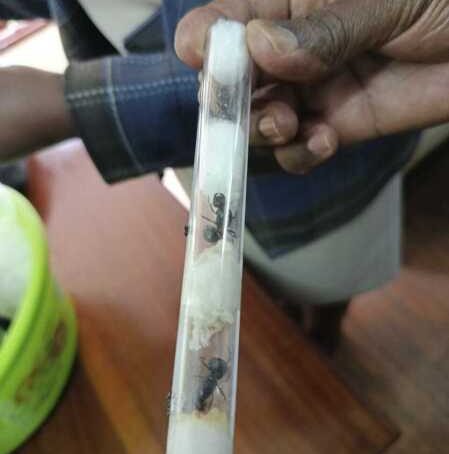
It wasn’t elephant tusks or rare reptiles, it was ants. Thousands of them. Packed into test tubes and syringes, queen ants with names like Messor cephalotes were found stuffed in luggage at a guesthouse in Kenya.
Their alleged smugglers? Two Belgian teenagers who claimed they were just collecting them “for fun,” according to AP. But as investigators dug deeper, it became clear: this wasn’t a quirky vacation hobby gone wrong. It was part of something much bigger and much weirder.
On April 5, 2025, Kenyan authorities arrested four men in two separate locations. Two of them – 19-year-olds Lornoy David and Seppe Lodewijckx – were reportedly found with over 5,000 ants housed in 2,244 test tubes at a guesthouse in Nakuru County, near several of Kenya’s national parks.
The other two men, a Kenyan and a Vietnamese national, were arrested in Nairobi with 400 ants. All four later pleaded guilty to illegal possession and wildlife trafficking charges at Nairobi’s Jomo Kenyatta International Airport Court.
According to the Kenya Wildlife Service, the group had carefully designed their equipment to smuggle ants through security: test tubes were packed with cotton wool to keep the insects alive for up to two months, a setup seemingly meant to withstand long-distance travel undetected.
Turns out, these weren’t just any ants. Among the species found were M. cephalotes, also known as the Giant African Harvester ant – striking creatures with vivid red and black colouring. Exotic pet enthusiasts prize them for their size, vibrant appearance and colony behaviour. They’re rare outside East Africa, difficult to breed, and fetch high prices on specialty pet markets in Europe and Asia.
While Lodewijckx and Lornoy told the court they didn’t realise what they were doing was illegal, they admitted they had come to Kenya with the intention of collecting and exporting the insects.
“We did not come here to break any laws. By accident and stupidity we did,” Lornoy told the court, according to People.
Lornoy David and Seppe Lodewijckx, two 19-year-olds who were arrested on April 5 with 5,000 ants at a guest house, appeared distraught during their appearance before a magistrate in Nairobi and were comforted in the courtroom by relatives. They told the magistrate they were collecting the ants for fun and did not know that it was illegal.
In a separate criminal case Kenyan Dennis Ng’ang’a and Vietnamese Duh Hung Nguyen also were charged with illegal trafficking in the same courtroom, following their arrest while in possession of 400 ants.
The Kenya Wildlife Service said the four men were involved in trafficking the ants to markets in Europe and Asia, and that the species included messor cephalotes, a distinctive, large and red-coloured harvester ant native to East Africa.
Wildlife trafficking is nothing new in Kenya, a country long battling the illegal trade of elephant ivory, rhino horn, and pangolins. But this case represents a pivot from large, iconic animals to lesser-known species.
In comments reported by People, the Kenya Wildlife Service said there has been “a disturbing shift in trafficking patterns – from iconic mammals to tiny but ecologically vital species.”
Philip Muruthi, vice president of conservation at the African Wildlife Foundation, warned of the ecological risks in comments reported by AP, saying: “The thing is, when you see a healthy forest, like Ngong Forest, you don’t think about what is making it healthy. It is the relationships all the way from the bacteria to the ants to the bigger things.”
He also noted that unregulated trade can introduce new diseases into foreign agricultural systems.
The ants were valued at Ksh1 million ($7,700). While that might seem low compared to elephant tusks or tiger bones, it’s a signal that wildlife crime is evolving. Smaller species are easier to transport, often less regulated and now just as valuable in the right niche markets.
For Kenya, the case is a warning siren. For conservationists, it’s a wake-up call to expand protections to include even the smallest players in the ecosystem. And for two Belgian teens who thought it might be fun to collect ants, it’s a lesson in how even the tiniest creatures can come with massive consequences.
The illegal export of the ants “not only undermines Kenya’s sovereign rights over its biodiversity but also deprives local communities and research institutions of potential ecological and economic benefits,” KWS said in a statement.
Kenya has in the past fought against the trafficking of body parts of larger species of wild animals such as elephants, rhinos and pangolins among others. But the cases against the four men represent “a shift in trafficking trends – from iconic large mammals to lesser-known yet ecologically critical species,” KWS said.
The two Belgians were arrested in Kenya’s Nakuru County, which is home to various national parks. The 5,000 ants were found in a guest house where they were staying and were packed in 2,244 test tubes that had been filled with cotton wool to enable the ants to survive for months.
The other two men were arrested in Nairobi where they were found to have 400 ants in their apartments. Kenyan authorities valued the ants at Ksh1 million ($7,700). The prices for ants can vary greatly according to the species and the market.
Philip Muruthi, a vice president for conservation at the Africa Wildlife Foundation in Nairobi, said ants play the role of enriching soils, enabling germination and providing food for species such as birds.
“The thing is, when you see a healthy forest, like Ngong forest, you don’t think about what is making it healthy. It is the relationships all the way from the bacteria to the ants to the bigger things,” he said.
Muruthi warned of the risk of trafficking species and exporting diseases to the agricultural industry of the destination countries.
“Even if there is trade, it should be regulated and nobody should be taking our resources just like that,” he said.
- A Tell Media report







